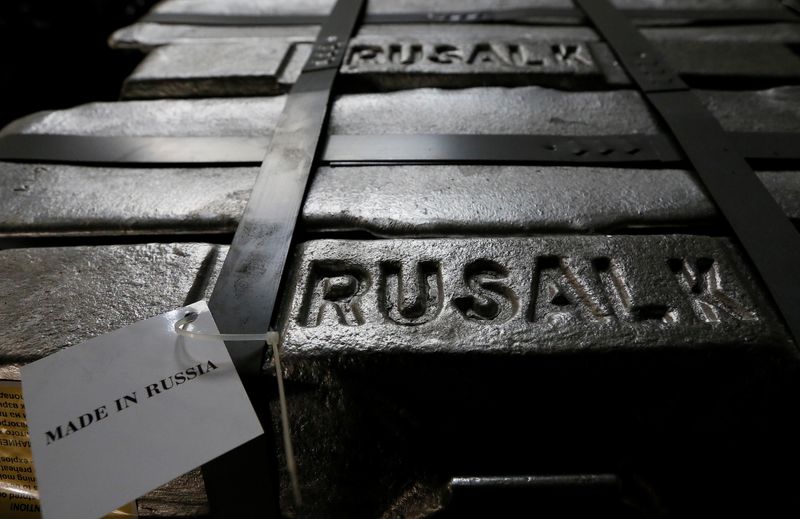By Polina Ivanova
MOSCOW (Reuters) - Rusal's (HK:0486) dollar bonds slumped to record lows, two major customers said they were reviewing their contracts, and the London Metal Exchange distanced itself from the aluminum giant on Tuesday, in the latest aftershocks from U.S. sanctions.
The sanctions imposed on Rusal and its boss, metals magnate Oleg Deripaska, mark the first time a major international company has been targeted by Washington in its moves to punish Russia for alleged meddling in the 2016 U.S. election.
While Russian markets, including the rouble, fell across the board on Monday, Rusal assets were hardest hit, with its Hong Kong-listed shares halving in value and the company warning it risked tipping into technical default.
On Tuesday its dollar bonds maturing in 2023 fell 17.3 cents to a new low, according to TradeWeb. Their yields had previously been steady at around 6 percent, but on Tuesday spiked to 28.5 percent, a record high.
Swiss-based commodities trader Glencore (L:GLEN), a Rusal shareholder and one of its biggest customers, said it was evaluating the position under its contracts with Rusal in the light of the sanctions.
Glencore chief executive Ivan Glasenberg also resigned from his role as a Rusal director.
Deripaska's companies have seen other resignations by non-Russian board members since the sanctions, with his newly created holding company En+ Group (L:ENPLq) saying board directors Dominique Fraisse and Zhao Guangming had quit on April 6 and 9 respectively.
To offset the impact of the punitive measures, Rusal has triggered a contingency plan asking customers to pay in euros instead of U.S. dollars in a bid to skirt the sanctions, a source close to the matter said.
This follows the example of Iran, which a few years ago opted to use gold, oil and the Japanese yen to pay for goods that would typically be priced in dollars.
Glencore also said it was pulling back from earlier plans to swap its 8.75 percent stake in Rusal for global depository receipts in En+.
"Glencore is committed to complying with all applicable sanctions in its business and is taking all necessary measures in order to mitigate any risks to Glencore's business as a result of the designation of Rusal and En+ as SDNs (specially designated nationals), including in respect of secondary sanctions," Glencore said in a statement.
"Glencore will not proceed with the transaction at this time in light of the designation of Rusal and En+ as SDNs," it said.
Matt Chamberlain, the chief executive of the London Metal Exchange (LME), said the LME would take steps to keep aluminum produced by Rusal and sold after the sanctions were imposed out of its warehouses.
Speaking in the Chilean capital, Chamberlain said aluminum that entered LME warehouses before the sanctions were imposed would not be affected.
CUSTOMERS WARY
The websites of Rusal and En+ were down on Tuesday evening for unknown reasons.
The U.S. sanctions explicitly bar U.S. entities from doing business with Rusal, but the impact extended to companies outside the United States too.
They are wary that Washington could slap so-called "secondary sanctions" on them if they are deemed to be facilitating Rusal's business.
Rio Tinto (L:RIO), a Rusal customer, said it was reviewing its trading relationship with the Russian firm.
"We will obviously do what we have to do to ensure that we comply with applicable sanctions," Alf Barrios, Rio Tinto Aluminium's chief executive, said in an interview.
But the company said it was premature to speculate on the future of an Australian venture of which Rusal is part owner. Rusal owns 20 percent of Rio's Queensland Alumina operation, and Rio owns the remaining 80 percent.
According to a Rusal prospectus, its other major customers include Toyota (T:7203).
Other foreign firms with ties to Deripaska's empire include Austrian construction company Strabag, in which the Russian's firm Rasperia has a blocking stake, and Singapore's Changi Airports International, which is a partner with a Deripaska-owned airports firm.
RUSAL DEBT
The sanctions are likely to mean Rusal is unable to pay the coupon, due on May 3, on one of its Eurobonds, putting the company in technical default on the paper, investors and analysts said.
Rusal has the money to pay the coupon, which is the interest payment on the bond, but will be unable to make the payment because it will be blocked off from essential bond market infrastructure such as clearing services, trading platforms and correspondent banks, market participants said.
The companies that provide those services are wary that, if they have to handle transactions relating to the Rusal bond, they too could come under sanctions risk.
Almost all of Rusal's $7.6 billion debt is dollar-denominated, making it difficult for the company to make repayments since the sanctions effectively cut off its access to the U.S. banking system and correspondent banks and creditors.
Rusal declined to comment on Tuesday. On Monday, it said: "The company intends to continue to fulfil its existing commitments in accordance with applicable legal and regulatory requirements."
